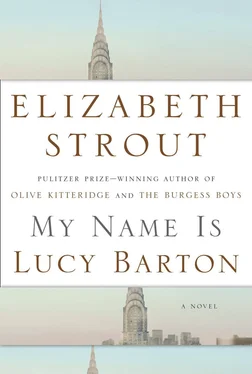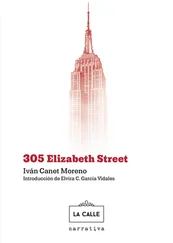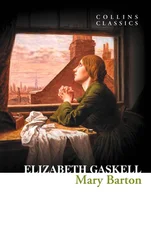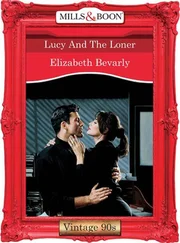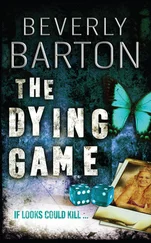All day I had wanted to speak to my girls, I could barely stand it, so I pushed my apparatus out into the hallway and asked the nurses if I could make a call from their desk, and they pushed a phone toward me, and I called my husband. I was desperate not to have any tears drip from my eyes. He was at work, and he felt bad for me, hearing how much I missed him and the kids. “I’ll call the sitter and have her call you just as soon as they’re home. Chrissie has a play date today.”
So life goes on, I thought.
(And now I think: It goes on, until it doesn’t.)
—
I had to sit in a chair at the nurses’ station while I tried not to cry. Toothache put her arm around me, and even now I love her for that. I have sometimes been sad that Tennessee Williams wrote that line for Blanche DuBois, “I have always depended on the kindness of strangers.” Many of us have been saved many times by the kindness of strangers, but after a while it sounds trite, like a bumper sticker. And that’s what makes me sad, that a beautiful and true line comes to be used so often that it takes on the superficial sound of a bumper sticker.
—
I was wiping my face with my bare arm when my mother came to find me, and we all — Toothache, myself, the other nurses — waved to her. “I thought you were napping,” I said as she and I went back to my room. She said that she had been napping. “The sitter may call soon,” I said, and I told her how Chrissie had a play date.
“What’s a play date?” my mother asked.
I was glad we were alone. “It just means she’s going to someone’s house after school.”
“Who’s the play date with?” my mother asked, and I felt that her asking was her way of being nice after what she must have seen in my face, my sadness.
As we walked down the hallway of the hospital, I told her about Chrissie’s friend, how the mother taught fifth grade and the father was a musician but also a jerk, kind of, and they were not happy in their marriage but the girls seemed to like each other a great deal, and my mother nodded throughout all this. When we got back to my room, the doctor was there. His face was businesslike as he swished the curtain and pressed on my scar. He said, brusquely, “About the scare last night: An inflammation was showing up in the blood and we needed the CAT scan. Get your fever down, keep some solid food down, and we can send you home.” His voice was different enough that he might have slapped me with each word. I said, “Yes, sir,” and did not look at him. I have learned this: A person gets tired. The mind or the soul or whatever word we have for whatever is not just the body gets tired, and this, I have decided, is — usually, mostly — nature helping us. I was getting tired. I think — but I don’t know — that he was getting tired too.
—
The sitter called. She was just a young girl, and she kept assuring me that the kids were doing fine. She held the phone to Becka’s ear, and I said, “Mommy will be home soon,” again and again and again, and Becka didn’t cry, so I was happy. “When?” she asked, and I kept saying soon, and that I loved her. “I love you, and you know that, right?” “What?” she asked. “I love you and I miss you and I’m here away from you so I can get well, and I’m going to get well, and then I’ll see you very soon, okay, angel?”
“Okay, Mommy,” she said.
In the Metropolitan Museum of Art, which sits so large and many-stepped on Fifth Avenue in New York, there is a section on the first floor referred to as the sculpture garden, and I must have walked past this particular sculpture many times with my husband, and with the children as they got older, me thinking only of getting food for the kids, and never really knowing what a person did in a museum of this nature where there were so many things to look at. In the middle of these needs and worries is a statue. And only recently — in the last few years — when the light was hitting it with a splendid wash, did I stop and look at it and say: Oh.
It is a marble statue of a man with his children near him, and the man has such desperation on his face and the children at his feet appear to be clinging, begging him, while he gazes out toward the world with a tortured look, his hands pulling at his mouth, but his children look only at him, and when I finally saw this, I said inside myself, Oh.
I read the placard, which let me know that these children are offering themselves as food for their father, he is being starved to death in prison, and these children only want one thing — to have their father’s distress disappear. They will allow him — oh, happily, happily — to eat them.
And I thought, So that guy knew. Meaning the sculptor. He knew.
And so did the poet who wrote what the sculpture has shown. He knew too.
—
A few times I made a trip to the museum specifically to see my starving father-man with his children, one grabbing at his leg, and when I got there I didn’t know what to do. He was as I had remembered him, and so I stood at a loss. Later I realized I got what I needed when there was a furtiveness to my seeing him, such as if I was in a hurry to meet someone elsewhere, or if I was with someone in the museum and I’d say I needed to use the bathroom, just to get away and see this on my own. But not on my own the same way as when I made the trip entirely alone to see this frightened starving father-man. And he is always there, except for once when he was not. The guard said he was upstairs in a special exhibit and I felt insulted by the whole thing, that others wanted to see him that much!
Pity us.
I thought those words later, as I thought of my response when the guard told me the statue was upstairs. I thought, Pity us. We don’t mean to be so small. Pity us — it goes through my head a lot — Pity us all.
“Who are these people?” my mother asked.
I was lying on my back facing the window; it was evening, and the lights of the city were starting to come on. I asked my mother what she meant. She answered, “These foolish people in this foolish magazine, I don’t know one name of any of them. They all seem to like to have their picture taken getting coffee or shopping, or—” I stopped listening. It was the sound of my mother’s voice I most wanted; what she said didn’t matter. And so I listened to the sound of her voice; until these past three days it had been a long time since I had heard it, and it was different. Perhaps my memory was different, for the sound of her voice used to grate my nerves. This sound was the opposite of that — always the sense of compression, the urgency.
“Look at this,” my mother said. “Wizzle, look at this. My goodness,” she said.
And so I sat up.
She handed me the gossip magazine. “Did you see this?”
I took it from her. “No,” I said. “I mean, I saw it, but I didn’t care.”
“No, but my goodness, I care. Her father was a friend of your father’s from a long, long time ago. Elgin Appleby. It says it right here, look at this. ‘Her parents, Nora and Elgin Appleby.’ Oh, he was a funny man. He could make the Devil laugh.”
“Well, the Devil laughs easily,” I said, and my mother looked at me. “How did Daddy know him?” It was the only time during her stay with me in the hospital that I remember being angry with her, and this was because she casually spoke of my father that way, after not speaking of him at all, except to mention his truck.
She said, “When they were young. Who knows, but Elgin moved to Maine and worked on a farm there, I don’t know why he moved. But look at her, this child, Annie Appleby. Look at her, Wizzle.” My mother pointed at the magazine she had handed me. “I think she looks— I don’t know.” My mother sat back. “What does she look like?”
Читать дальше
